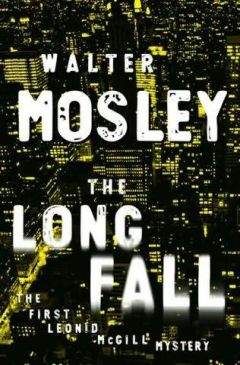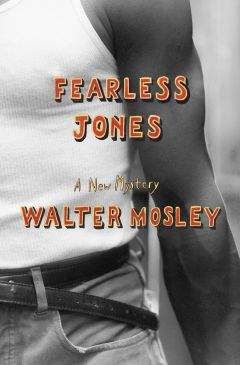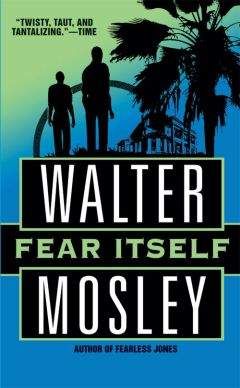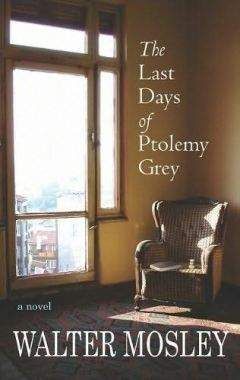“May I help you?”
“I wanted to see your father, Hannah,” I said.
“Have we met?”
“No.”
“Oh.”
“Is he here?”
“My father?”
“Yes.”
“No.”
“When do you expect him?”
“What is your business with my father, Mr. McGill?” This phrase I believed came from the instinctual caution of the wealthy.
“It’s a private matter.”
“Oh,” she said, pouting over the words. “Well . . . what do you do for a living?”
“Many things,” I said with gravity. “I work for myself, but always on someone else’s behalf.”
“That’s cryptic,” her college education said.
“We’ve just met,” I replied.
That got her to smile.
“Come on in.” She made a jaunty turn and led the way into the gray mausoleum.
Hannah traipsed down the entrance hall. She was wearing a tawny shift with an uneven hem that showed a lot of her powerful and slender legs. There was a city girl’s sway to her hips.
The hallway was lined with family portraits and pastel-colored doors.
We came to a room that was kidney-shaped and small. There was a burgundy couch and a matching chair arranged around a fireplace.
The girl gestured toward the chair.
“Please have a seat,” she said, or, rather, her breeding said with reflexive grace.
She flopped down on the sofa, pulling one foot up on the cushion.
I sat, taking care not to stare at her hamstrings.
“I want to be a pilot,” she said. This childish bravado I thought might be the real Hannah Hull. “What do you think about that, Mr. McGill?”
I hunched my shoulders and poked out my lower lip. “The sky’s the limit as far as I’m concerned.”
“That’s pretty brave of you.”
“What’s brave about telling a young person that they can do something?”
“My father might be mad at you,” she said speculatively.
“I don’t owe him a thing.”
This answer so surprised Hannah that she sat upright and stared.
“Why are you here?”
“Do you know a Thom Paxton or a Willie Sanderson?”
“I never heard of Thom Paxton. I don’t know a Willie, either, but once we had a woman work for us, a cleaning lady named Sanderson. Lita Sanderson. I don’t remember her having a family. Who are these people?”
“One of them died seventeen years ago,” I said. “The other, Sanderson, tried to kill me maybe seventy-two hours back.”
“He really tried to kill you?” She moved to the edge of her seat.
“Really, really.”
“And you think my father knows something about it?”
“I think he might know something about Paxton or Sanderson.”
“Murder is the worst crime man can commit,” she said.
“It’s very high on the list,” I agreed.
“I want to be a pilot,” she said again, “but I’m studying philosophy.”
“At Wellesley.”
“Yes. How do you know that?”
“The rich can’t hide much from the people,” I replied, thinking that I had heard the same words from my father, though intending something very different.
“I’m doing a summer paper on anarchism,” she went on, shrugging off my insincere Marxist patter. “It’s about people who believe that they are morally required to share the fates of their victims. In other words, the murderer must murder himself to keep his intentions pure. What do you think about that?”
I felt as if someone had stabb³€eone haded me in the liver. This pain didn’t start with Karmen Brown, it was something from a long time ago, a cloud that hung over the length of my entire life. It was rare that I was ever touched so deeply by a stranger. I looked up at the girl. Her expression was inscrutable but nonetheless intent.
“I need to speak to your father,” I said, automaton-like. “When will he be home?”
“They’re at our house in the city,” she said. “Two blocks north and half a block west of Gracie Mansion. It’s a big, ugly house.”
I stood up abruptly, feeling that knife shift in my gut.
Hannah stood up, too.
She reached out, maybe intending to stay me by touching my hand. But she didn’t touch me.
I have a daughter—sort of. I’m over half a century in age but I felt something very natural about this aborted invitation. There was a momentary connection between us.
“Who the hell are you?” someone shouted.
Ê€„
38
Standing in the doorway of the kidney-shaped den was a very skinny and tall young man with wiry red hair that stood up here and there. His eyes were bluish and his expression one of indignation that teetered upon madness.
This, I knew, was Fritz, Hannah’s slightly older brother. There seemed to me something natural about this wild intrusion, like the comic relief in a bloody slasher film.
Fritz wore a dark-green jacket, brown trousers, a buff-colored shirt, and a red-and-black bow tie. He wasn’t wearing glasses but should have been—to make the geek image complete.
“Who the hell are you?” he asked again, a little louder this time.
“You don’t have to shout, Fritzie,” Hannah said. “This is Mr. McGill. He’s looking for Daddy.”
“Why is he in my house?”
“It’s my house, too,” the princess said to the nerd.
“What are you doing with my sister?” Fritz asked me.
I couldn’t help but feel a little bit exposed, a masher in the sudden light of a passing car.
“What are you doing to my sister?” he said again, this time looking at Hannah.
“He’s not doing anything. He was just telling me about why he’s here.”
“He might be stealing from us,” Fritz said. His agitation was definitely escalating.
“I’ve been with him the whole time,” Hannah argued. “How can he steal anything when we’re sitting down, looking at each other?”
“He has pockets,” the boy pointed out as if having discovered a new continent in the distant ocean. “I have to search him. He could have taken something when you weren’t looking.”
I began to think that Bryant Hull’s endowment of the Sunset Sanatorium might have been a wise long-term investment.
“You wouldn’t want to do that,” I said to Fritz in a detached, objective tone.
“I sure the hell do.”
“No you don’t.”
“Why not?” he screamed.
“Because I’m a trained fighter and if you touch me I’ll knock you unconscious. And when you’re out cold, imagine how much I could steal before you came to.”
“Why did you let him in here?” Fritz yelled, turning on his sister.
The girl’s response was to look at me. She didn’t want me to do anything. Hannah just asked me silently, with her eyes, to bear witness to something she lived through every day, or maybe every other day, making the span in between one of dread.
I thought, Of course she wants me to stay. And of course she couldn’t ask. I understood the impulse in an instant. I wanted to protect her but didn’t know how.
So I turned my attention to Fritz, worried that in his agitation he might try something foolish.
The boy was standing in place, shivering—no, shaking. The tremors were increasing. His eyes lost their focus. Pretty soon his balance was affected. As he fell, I stepped forward and caught him. His was an awkward weight because he’d gone rigid. I lowered him to the couch as his sister fled the room.
I wanted to run myself but there were flecks of foam coming from the boy’s mouth. He was shuddering. I looked around the room searching for a wedge that I could put between his teeth to keep him from biting his tongue. His blue eyes were wide, staring right at me, indicting me as a dead man accuses his murderer.
For a brief moment I felt the urge to kill him, to wrap my hands around his throat the way Willie Sanderson had done to me.
I squelched the impulse before Hannah scurried back into the room. She was carrying an alligator case that she unzippered while running to her brother’s side. She took out a disposable syringe that was already filled with an amber fluid.
“Help me!”
“What?” I asked.
“Pull off his jacket.”
It wasn’t easy but I turned the boy on his side, yanking against his jacket collar, pressing down on his rigid arms. When I got it down to the middle of his forearms Hannah moved in between us. He was wearing a short-sleeved shirt and so she easily found the vein just below the biceps and then expertly injected the medicine.
Maybe twelve seconds later Fritz relaxed and fell into a deep sleep.
Hannah sat down on the floor and sighed.
It was the family photograph that would never be taken: a sister who had just saved her brother, exhausted by the lifelong task of having to be there when the emergency arose. Why didn’t he have a nurse? Why wasn’t he on a regular regimen of drugs? Because Hannah was there to save him and to bear the brunt of his imbalance and frenzy.
She stood up and began pulling on her brother’s arm.
“Help me take him upstairs,” she said.
“Shouldn’t you call a doctor?”
“No. This happens all the time. He’ll be fine.”
“Don’t you have any servants that can help?”
“They’d tell my parents and then Fritzie would be hospitalized. He can’t stand that. He’ll kill himself if they commit him again.”
I bent down and lifted the skinny boy in my arms.
“Where?”
She led me further down the hall, away from the front of the house. After a little way we came to a staircase leading up. I carried the kid to the second floor and, under Hannah’s direction, brought him to a small room filled with various kinds of science tools: a microscope and telescope, a rock collection and butterfly pinboard. There were no posters, not even any music players. Here was a young man born to one of the wealthiest families in America and he didn’t even have a TV set.
I put him down on the single bed and stood back while Hannah undressed him. She took off all of his clothes and threw a sheet over him. Then she folded his shirt and pants, placing them on a walnut table in the corner.
Fritz looked very different in his sleep: older and defeated. I watched him for a while before Hannah touched my arm and we walked out into the hall.
I hadn’t registered the surroundings before as I was straining under Fritz’s deadweight. The white carpets were of thick virgin wool and the paintings on the hall walls were originals by Chagall, Picasso, and the like.
“Thank you,” Hannah said, attempting to express some deeper feeling.
I remembered the young woman who had made love to me in her small apartment. A little tingle in my chest was the hope that I could actually make up for some of the wrong that I’d done.
“It was nothing,” I said.
“You didn’t have to stay and help,” she said. “You don’t even know us.”
“It’s okay,” I replied, placing two fingers on the crook of her elbow.
It wasn’t anything sexual or suggestive. She folded her arm, hugging my fingers in that fashion to show how much the little I’d done had meant. And I understood. Unconscious, casual kindness is sometimes felt most deeply.
“I like you,” she said, and my heart, despite all intentions, quailed.
“I have to go.”
Ê€„
39
The rest of that day consisted of the drive back to Albany, a bottle of Wild Turkey, and a dreamless sprawl on the big bed at the Minerva; that and a midnight call from Katrina.
“Huh?” I said into the cell phone, so eloquently articulating my state of mind.
“Leonid?”
“I’m in Albany, Katrina. I need to sleep.” These words bumped around in my head, reminding me of my eldest, my only blood child.
“I just wanted to tell you that we can work something out,” she said.
“I’ll talk to you later.”
The next thing I knew it was morning and I wasn’t sure what my wife had meant or if she had called at all.
I DECIDED TO TAKE the train back to New York. I couldn’t face the notion of flitting around in the sky after the emotional chaos of the Hulls’ house.
When I was a kid, living in enforced poverty because of my father’s commitment to being working class, I used to pray that I would be adopted by a family of rich capitalists. In the fantasy, my father went away, never to return, and Mr. and Mrs. Moneybags decided to take me in, feeling sorry for the poor, black, red-diaper orphan.
My father did go away, and my mother died for good measure, but I never got adopted. Looking at Fritz and Hannah, I couldn’t help but feel that maybe I got off lucky.
AS THE LOCAL TRAIN wended its way down toward Manhattan I sifted through the various newspapers and books I carried in my bag. But after a while I realized reading was beyond me.
At first this was because I couldn’t get my bourbon-soaked mind off of Hannah Hull. Most people I get a read on pretty quickly; it’s a requirement in my line of work. But Hannah was indecipherable to me. She could have been a psychotic child with depraved tendencies, though I didn’t want to believe that. I wanted to believe that she was the victim of a family that had veered off course, that she saw in me a man who could be relied upon—a jutting rock in a stormy sea.
That was the role I fantasized myself in since relinquishing my underhanded ways. I wanted to be seen as I hoped Hannah had seen me.
It was almost funny, the way I was buffeted around by these mercurial emotions. A step or two more, I thought, and I might have turned into Fritz. This realization brought a smile to my lips.




